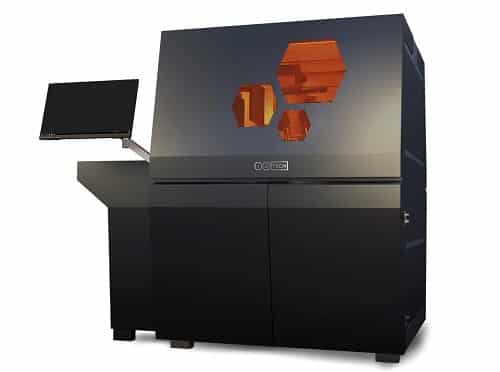The printer range comes with Continuous Laser Assisted Deposition (C.L.A.D) technology for mass-manufacturing of semiconductors and boards

For the first time, manufacturers can use their standard certified industrial materials, control the deposition of every single drop and reach unmatched production yields, thanks to the io300 Continuous Laser Assisted Deposition (C.L.A.D) printer range by ioTech Group Ltd. (“ioTech”).
The technology’s speed and resolution enable the delivery of commercial solutions across multiple industries, with great potential for digital mass-manufacturing applications such as semiconductor packaging and advanced printed circuit board production and assembly.
Ultra-fast, highly accurate, high-resolution printing of up to five different materials simultaneously, including polymers, metals, ceramics and solder, is made possible by the printer’s unique nozzle-free, non-contact laser jet printing and deposition capabilities.
Advantages include:
- No clogging due to no nozzles, thereby handling high-viscosity materials efficiently than nozzle-based systems such as inkjet. Higher viscosity materials enable the deposition of thicker layers and reduce deposition time. Their conductive inks support higher aspect ratios, reducing electrical resistance without taking up extra space on the substrate.
- Material agnostic i.e. material supply flexibility and current materials that have met stringent OEM qualification requirements can be used. Ceramics or metal pastes can be deposited along with polymers, adhesives and solder.
- The non-contact method allows compatibility with any substrate material (including non-planar surfaces) unlike laser direct structuring (LDS). No additives are required.
- Unlike screen printing, which also supports the rapid deposition of high viscosity materials, C.L.A.D. is a digital method, enabling ‘mass customisation’ as well as rapid prototyping (since a new mask is not needed for each iteration). It allows for designs with multiple materials and multiple layers.
- Current additive deposition methods in the PCB manufacturing space are slow and generally limited to prototyping with the final products made using traditional subtractive, or semi-additive, methods. The C.L.A.D. system is fast enough for high-mix low-volume manufacturing of high-end PCBs and can be used for both prototyping and production, adding process reliability and reducing development steps.
“The io300 printer range can deposit most flowable industrial materials. It allows operations to increase production efficiencies while embracing a more agile manufacturing approach. They can deliver fully functional products, fast and in an eco-friendly manner. They enable the production of “until-now-impossible-to-manufacture” designs. Our technology is set to change many manufacturing processes from SMT and packaging to PCB manufacturing,” said Hervé Javice, ioTech’s co-founder and CEO.
The io300 Continuous Laser Assisted Deposition (C.L.A.D) printer range will be launched at the productronica 2021.






